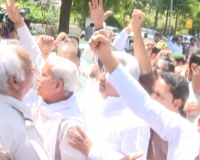India Suspends Indus Waters Treaty: Impact on Pakistan

India suspends the Indus Waters Treaty after Pahalgam terror attack.
Suspension gives India greater control over western rivers.
Pakistan faces water shortages, economic collapse, and rising tensions.
In a bold response to the Pahalgam terror attack, India has announced the immediate suspension of the Indus Waters Treaty with Pakistan. The decision, made in a Cabinet Committee on Security meeting led by Prime Minister Narendra Modi, is seen as a significant move in retaliation against Pakistan’s actions. The treaty, signed in 1960, governed water distribution from the Indus River system, with India using waters from the eastern rivers (Ravi, Beas, Sutlej) and Pakistan controlling the western rivers (Indus, Jhelum, Chenab).
The suspension gives India greater freedom to use waters from the western rivers, which could have severe consequences for Pakistan. Experts predict that if India eventually terminates the treaty, it would affect Pakistan’s agriculture and economy, which rely heavily on water from these rivers. Restrictions on India's water storage and project construction on these rivers would be lifted, potentially leading to water shortages in Pakistan.
Pakistan’s agricultural sector, which depends on the flow of these rivers, would face significant challenges, threatening food security and livelihoods. Additionally, disruptions in hydroelectric power generation could lead to an electricity crisis. The political and economic consequences could be dire, pushing Pakistan toward an economic collapse.
The suspension also raises concerns about increased tensions between the two nations, which have long had strained relations despite the treaty. India’s decision to suspend the agreement could further destabilize the region and lead to a diplomatic struggle, with Pakistan likely seeking international mediation. The future of the historic Indus Waters Treaty is now uncertain, with both countries facing a complex and tense diplomatic situation.












